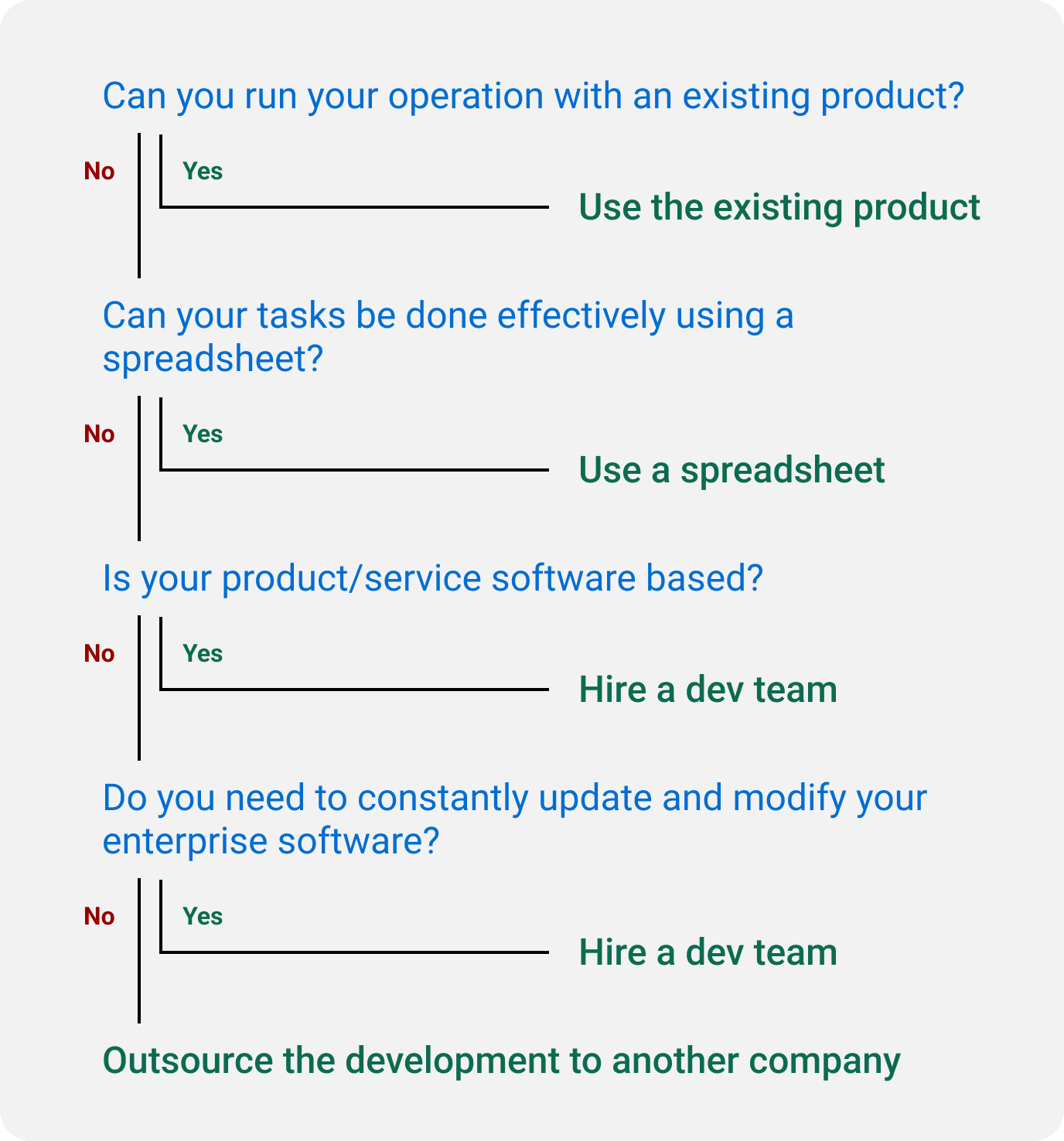Which one to choose?
Outsourcing software development vs hiring a dev team
As your operation grows in size, you will need a customized software. Should you hire a team of developers or outsource the project?
Every company uses software in its daily operations, regardless of the nature of the business. Each company is unique in its own way and operates differently, becoming more distinguished as the size of the operation, number of employees, and market share grow in size.
So, as your workflow gets heavier and more complicated, what software should you use? Should you develop a customized solution to fit your specific needs? If yes, should you hire a team of developers or outsource the development process to a third-party company? The answer depends on your needs and the nature of your business.

Off-the-shelf software
For every common problem or workflow, there are multiple pre-made products on the market. Based on your circumstances, the products you need may have been in active development for many years. Each product focuses on a specific field, so you would probably need to use a combination of products.
There are two cases where you should use a ready-made product in your operation.
Generic internal needs
Every company needs to use software to run its day-to-day operations. In most cases, companies use a software solely for their internal operations and management, and their products or services have nothing to do with software.
For example, a manufacturing company has to use a solution to manage its inventory. The ultimate product they offer is the physical good they manufacture, regardless of how critical or necessary their internal software might be. As long as they operate effectively, their customers don't care what type of software they use internally.
If your products or services have nothing to do with software and if you can run your business with off-the-shelf products, you should!
In almost all cases, a ready-made product is much cheaper and faster to implement than a customized solution. Paying a one-time fee or a periodic subscription is much more economical than creating a similar and mature solution from scratch.
Unique and small needs
No two company works the exact same way. Your business, just like any other, will have some unique needs at some point. These unique needs are the result of your specific circumstances and no off-the-shelf product can possibly provide a solution.
Obviously, having customized software to manage and automate these unique tasks is wonderful. However, in many cases, the task at hand is small and can be accomplished using a spreadsheet or document editing software such as Microsoft Word.
Again, if your unique needs are small and you can operate effectively using spreadsheets or other generic software, you should!
Replicating a spreadsheet in code will be time-consuming and costly. Even the largest software companies on the planet use spreadsheets for many of their small and routine tasks. In most cases, it would make much more sense to use a spreadsheet than to create a full-blown solution.
Customized software
Even though most of the work in a company can be done using an off-the-shelf product, there will be a time when you would need to look for a bespoke solution to fit your specific needs and circumstances.
There are basically three cases where you have to choose customized software over a pre-made one.
- You can't find a product for your specific needs. Either such a product/feature has never been developed, or the existing solutions are not accessible for some reason.
- Your operation has expanded, your workflow has become very specialized, and the generic products on the market have become cumbersome or expensive to use.
- Your primary product/service is software based or has customer-facing applications.
Many businesses often use a combination of generic software and spreadsheets when their operations are small, but soon feel overwhelmed as their workload increases. We see this pattern very commonly. A manual task that could have taken 5 minutes in the beginning, has turned into a large, complicated, and error-prone task taking hours to complete.
As your operation and workload grow, you will reach a point where you need a solution to adapt to your specific workflow. So, should you recruit a team of engineers or hire a company to develop and deliver the solution?
Hiring in-house developers
The first approach is to hire a team of software engineers. There are two scenarios where having a team of engineers makes the most sense.
- Your product/service is software-based, or your product/service requires a branded and unique customer-facing application.
- The solution you need requires constant and regular updates and modifications for a considerable time.
You would be better off with an in-house team if any one of these two cases applies to you. Your engineers will focus entirely on your project, allowing them to deliver the best possible outcome.
However, hiring a team of software engineers can be challenging for many companies. Selecting the right individuals from a pool of applicants is a daunting task. Many companies underestimate the difficulty of this task, using hiring managers with limited or no prior experience in software.
Software is a technical field, filled with unfamiliar and strange concepts. You initially have to draw a plan and choose the basic technical stack. These decisions will determine your recruitment plans. The engineers joining your team must be familiar with the technologies you plan to use.
If you have no prior experience in the software industry, you should consider hiring a consultant. The consultant must be able to draw the initial plan, choose the right tech stack, and manages the initial recruitment. Once you have a reliable team of engineers, you can use your existing base to hire further engineers if the need arises.
Outsourcing to other companies
In many cases, maintaining a team of developers is not the right approach.
Most companies need customized software to either solve a series of problems or automate some part of their operations. Once the required solution reaches a level of maturity, this type of software might only need a periodic update or adjustment.
In the past, enterprise software needed a local setup. This local setup involves a central computer working as the server, connecting all the devices, and managing the data. Managing your own infrastructure is expensive and cumbersome. It requires having an IT specialist or constant contact with a service provider to provide support if and when something goes wrong.
Nowadays, we rely on cloud-based servers. The computers that store and manage your data are in a data center and are maintained by the cloud provider. You don't need to have any expensive physical setup in your office. You only need to have an internet connection. Not only your employees can work from anywhere and use any device they prefer, but your data is also much safer.
Most cloud-based enterprise solutions are developed in a few months, delivered, and only require periodic maintenance and updates. With such a setup, you don't need to hire any engineers or IT specialists.
A company specialized in enterprise software can develop the solution you need. Such companies design, develop and deliver the software you need. You just need to make sure that you and the developer company share a similar viewpoint on the problem and the possible solutions.
